Organisational Behaviour Report: Analysis of River Island's Practices
VerifiedAdded on 2023/01/13
|15
|5247
|36
Report
AI Summary
This report delves into the realm of organisational behaviour, focusing on the fashion brand River Island. It examines the influence of culture, politics, and power on individual and team performance, analyzing how these factors shape workplace dynamics. The report explores various motivational theories, including Maslow's hierarchy of needs, and assesses their application in achieving organisational goals. It also discusses the characteristics of effective and ineffective teams, along with theories of team development. Furthermore, the report applies organisational behaviour concepts and philosophies within the context of River Island, investigating how these elements impact employee behaviour in both positive and negative ways. The analysis covers topics such as power dynamics, cultural practices, and their combined effect on employee productivity and overall organisational success, including the importance of employee motivation and team effectiveness.
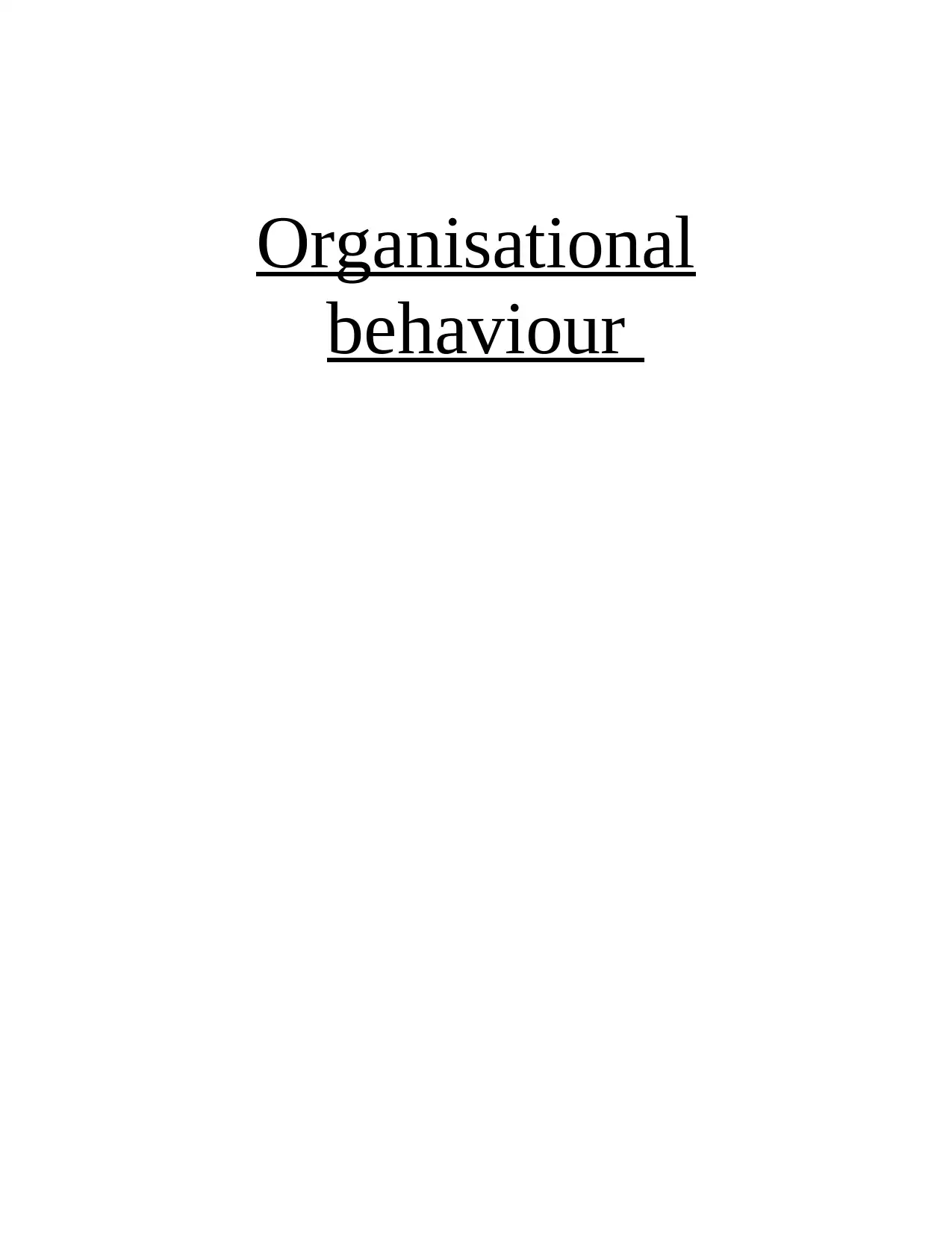
Organisational
behaviour
behaviour
Paraphrase This Document
Need a fresh take? Get an instant paraphrase of this document with our AI Paraphraser
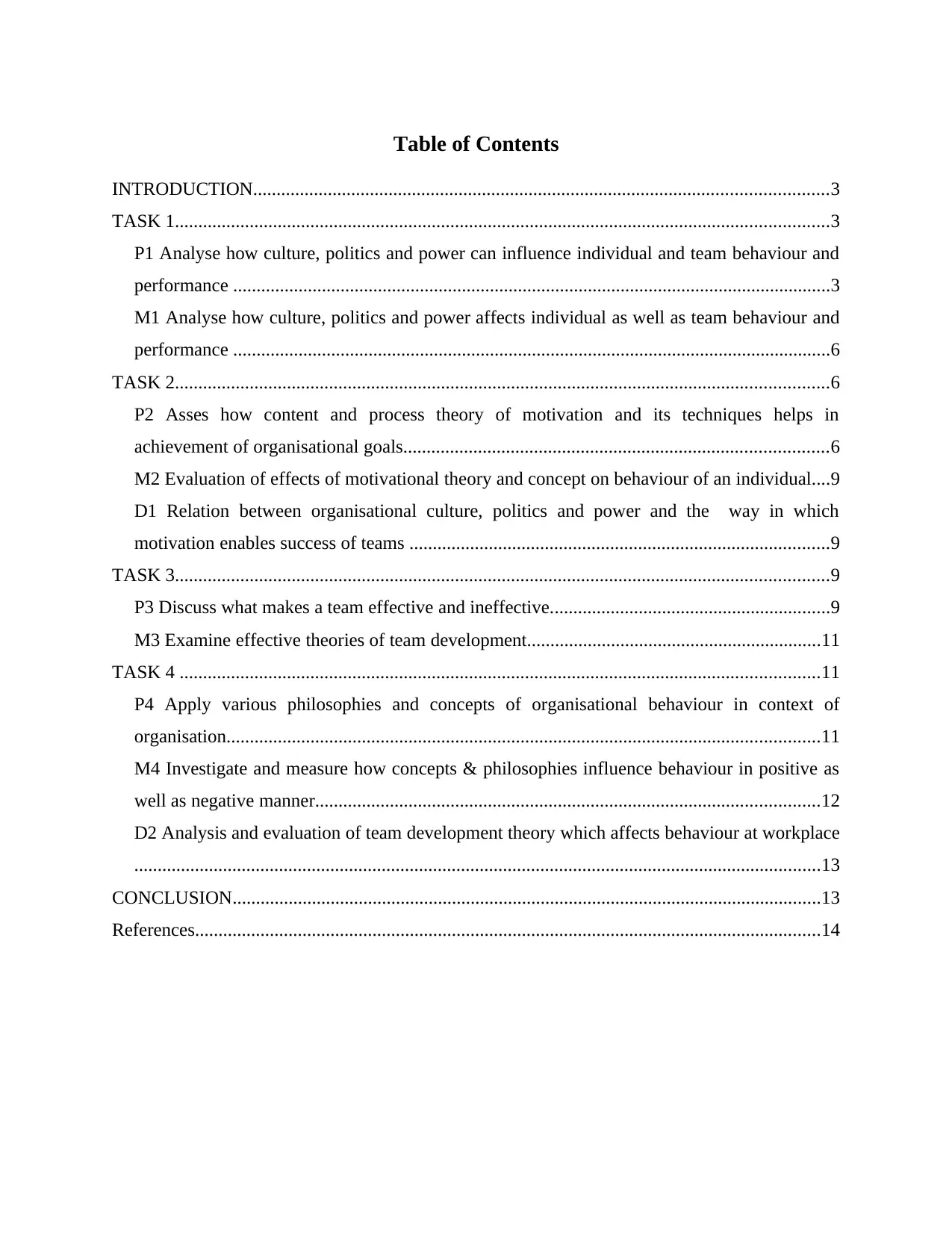
Table of Contents
INTRODUCTION...........................................................................................................................3
TASK 1............................................................................................................................................3
P1 Analyse how culture, politics and power can influence individual and team behaviour and
performance ................................................................................................................................3
M1 Analyse how culture, politics and power affects individual as well as team behaviour and
performance ................................................................................................................................6
TASK 2............................................................................................................................................6
P2 Asses how content and process theory of motivation and its techniques helps in
achievement of organisational goals...........................................................................................6
M2 Evaluation of effects of motivational theory and concept on behaviour of an individual....9
D1 Relation between organisational culture, politics and power and the way in which
motivation enables success of teams ..........................................................................................9
TASK 3............................................................................................................................................9
P3 Discuss what makes a team effective and ineffective............................................................9
M3 Examine effective theories of team development...............................................................11
TASK 4 .........................................................................................................................................11
P4 Apply various philosophies and concepts of organisational behaviour in context of
organisation...............................................................................................................................11
M4 Investigate and measure how concepts & philosophies influence behaviour in positive as
well as negative manner............................................................................................................12
D2 Analysis and evaluation of team development theory which affects behaviour at workplace
...................................................................................................................................................13
CONCLUSION..............................................................................................................................13
References......................................................................................................................................14
INTRODUCTION...........................................................................................................................3
TASK 1............................................................................................................................................3
P1 Analyse how culture, politics and power can influence individual and team behaviour and
performance ................................................................................................................................3
M1 Analyse how culture, politics and power affects individual as well as team behaviour and
performance ................................................................................................................................6
TASK 2............................................................................................................................................6
P2 Asses how content and process theory of motivation and its techniques helps in
achievement of organisational goals...........................................................................................6
M2 Evaluation of effects of motivational theory and concept on behaviour of an individual....9
D1 Relation between organisational culture, politics and power and the way in which
motivation enables success of teams ..........................................................................................9
TASK 3............................................................................................................................................9
P3 Discuss what makes a team effective and ineffective............................................................9
M3 Examine effective theories of team development...............................................................11
TASK 4 .........................................................................................................................................11
P4 Apply various philosophies and concepts of organisational behaviour in context of
organisation...............................................................................................................................11
M4 Investigate and measure how concepts & philosophies influence behaviour in positive as
well as negative manner............................................................................................................12
D2 Analysis and evaluation of team development theory which affects behaviour at workplace
...................................................................................................................................................13
CONCLUSION..............................................................................................................................13
References......................................................................................................................................14
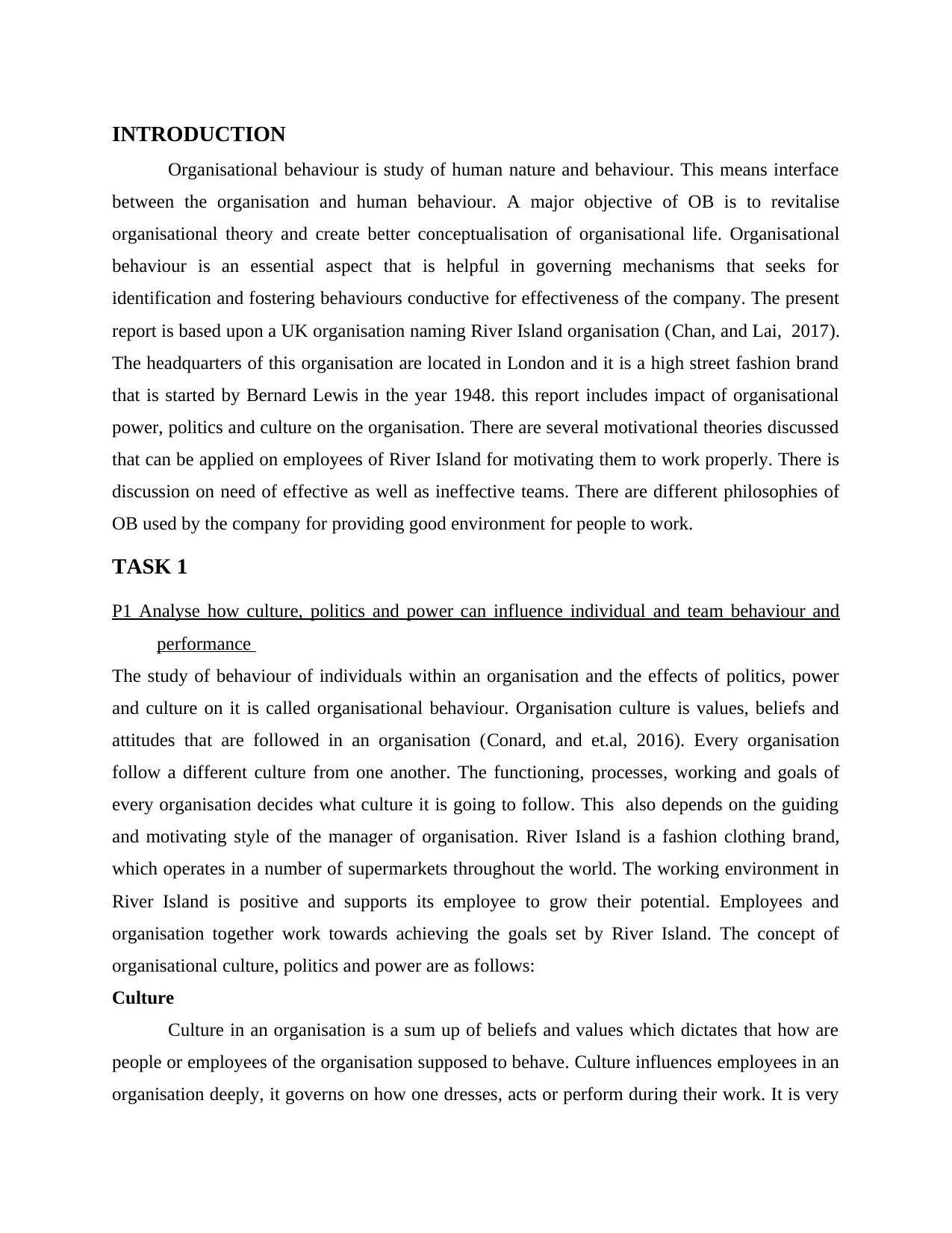
INTRODUCTION
Organisational behaviour is study of human nature and behaviour. This means interface
between the organisation and human behaviour. A major objective of OB is to revitalise
organisational theory and create better conceptualisation of organisational life. Organisational
behaviour is an essential aspect that is helpful in governing mechanisms that seeks for
identification and fostering behaviours conductive for effectiveness of the company. The present
report is based upon a UK organisation naming River Island organisation (Chan, and Lai, 2017).
The headquarters of this organisation are located in London and it is a high street fashion brand
that is started by Bernard Lewis in the year 1948. this report includes impact of organisational
power, politics and culture on the organisation. There are several motivational theories discussed
that can be applied on employees of River Island for motivating them to work properly. There is
discussion on need of effective as well as ineffective teams. There are different philosophies of
OB used by the company for providing good environment for people to work.
TASK 1
P1 Analyse how culture, politics and power can influence individual and team behaviour and
performance
The study of behaviour of individuals within an organisation and the effects of politics, power
and culture on it is called organisational behaviour. Organisation culture is values, beliefs and
attitudes that are followed in an organisation (Conard, and et.al, 2016). Every organisation
follow a different culture from one another. The functioning, processes, working and goals of
every organisation decides what culture it is going to follow. This also depends on the guiding
and motivating style of the manager of organisation. River Island is a fashion clothing brand,
which operates in a number of supermarkets throughout the world. The working environment in
River Island is positive and supports its employee to grow their potential. Employees and
organisation together work towards achieving the goals set by River Island. The concept of
organisational culture, politics and power are as follows:
Culture
Culture in an organisation is a sum up of beliefs and values which dictates that how are
people or employees of the organisation supposed to behave. Culture influences employees in an
organisation deeply, it governs on how one dresses, acts or perform during their work. It is very
Organisational behaviour is study of human nature and behaviour. This means interface
between the organisation and human behaviour. A major objective of OB is to revitalise
organisational theory and create better conceptualisation of organisational life. Organisational
behaviour is an essential aspect that is helpful in governing mechanisms that seeks for
identification and fostering behaviours conductive for effectiveness of the company. The present
report is based upon a UK organisation naming River Island organisation (Chan, and Lai, 2017).
The headquarters of this organisation are located in London and it is a high street fashion brand
that is started by Bernard Lewis in the year 1948. this report includes impact of organisational
power, politics and culture on the organisation. There are several motivational theories discussed
that can be applied on employees of River Island for motivating them to work properly. There is
discussion on need of effective as well as ineffective teams. There are different philosophies of
OB used by the company for providing good environment for people to work.
TASK 1
P1 Analyse how culture, politics and power can influence individual and team behaviour and
performance
The study of behaviour of individuals within an organisation and the effects of politics, power
and culture on it is called organisational behaviour. Organisation culture is values, beliefs and
attitudes that are followed in an organisation (Conard, and et.al, 2016). Every organisation
follow a different culture from one another. The functioning, processes, working and goals of
every organisation decides what culture it is going to follow. This also depends on the guiding
and motivating style of the manager of organisation. River Island is a fashion clothing brand,
which operates in a number of supermarkets throughout the world. The working environment in
River Island is positive and supports its employee to grow their potential. Employees and
organisation together work towards achieving the goals set by River Island. The concept of
organisational culture, politics and power are as follows:
Culture
Culture in an organisation is a sum up of beliefs and values which dictates that how are
people or employees of the organisation supposed to behave. Culture influences employees in an
organisation deeply, it governs on how one dresses, acts or perform during their work. It is very
⊘ This is a preview!⊘
Do you want full access?
Subscribe today to unlock all pages.

Trusted by 1+ million students worldwide
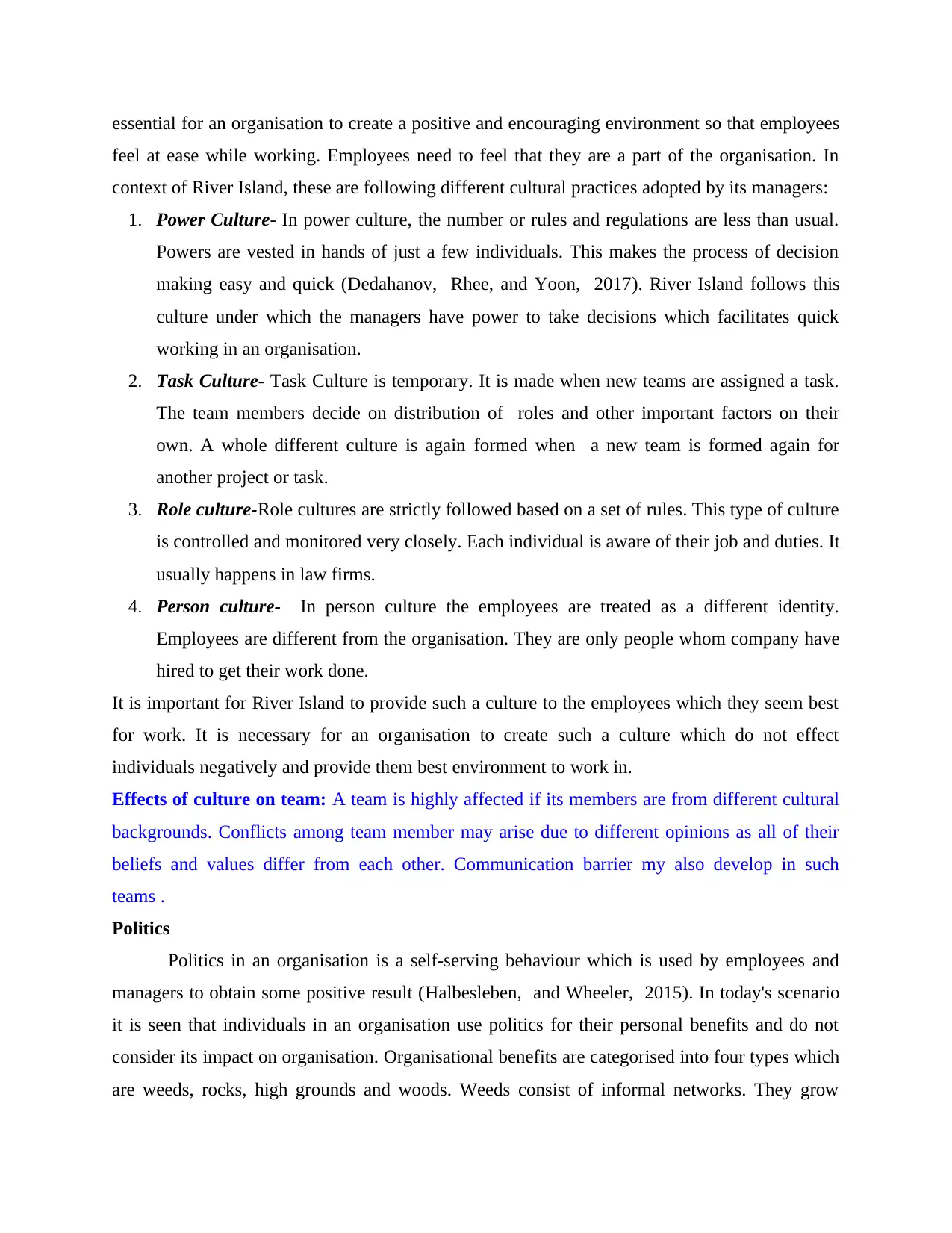
essential for an organisation to create a positive and encouraging environment so that employees
feel at ease while working. Employees need to feel that they are a part of the organisation. In
context of River Island, these are following different cultural practices adopted by its managers:
1. Power Culture- In power culture, the number or rules and regulations are less than usual.
Powers are vested in hands of just a few individuals. This makes the process of decision
making easy and quick (Dedahanov, Rhee, and Yoon, 2017). River Island follows this
culture under which the managers have power to take decisions which facilitates quick
working in an organisation.
2. Task Culture- Task Culture is temporary. It is made when new teams are assigned a task.
The team members decide on distribution of roles and other important factors on their
own. A whole different culture is again formed when a new team is formed again for
another project or task.
3. Role culture-Role cultures are strictly followed based on a set of rules. This type of culture
is controlled and monitored very closely. Each individual is aware of their job and duties. It
usually happens in law firms.
4. Person culture- In person culture the employees are treated as a different identity.
Employees are different from the organisation. They are only people whom company have
hired to get their work done.
It is important for River Island to provide such a culture to the employees which they seem best
for work. It is necessary for an organisation to create such a culture which do not effect
individuals negatively and provide them best environment to work in.
Effects of culture on team: A team is highly affected if its members are from different cultural
backgrounds. Conflicts among team member may arise due to different opinions as all of their
beliefs and values differ from each other. Communication barrier my also develop in such
teams .
Politics
Politics in an organisation is a self-serving behaviour which is used by employees and
managers to obtain some positive result (Halbesleben, and Wheeler, 2015). In today's scenario
it is seen that individuals in an organisation use politics for their personal benefits and do not
consider its impact on organisation. Organisational benefits are categorised into four types which
are weeds, rocks, high grounds and woods. Weeds consist of informal networks. They grow
feel at ease while working. Employees need to feel that they are a part of the organisation. In
context of River Island, these are following different cultural practices adopted by its managers:
1. Power Culture- In power culture, the number or rules and regulations are less than usual.
Powers are vested in hands of just a few individuals. This makes the process of decision
making easy and quick (Dedahanov, Rhee, and Yoon, 2017). River Island follows this
culture under which the managers have power to take decisions which facilitates quick
working in an organisation.
2. Task Culture- Task Culture is temporary. It is made when new teams are assigned a task.
The team members decide on distribution of roles and other important factors on their
own. A whole different culture is again formed when a new team is formed again for
another project or task.
3. Role culture-Role cultures are strictly followed based on a set of rules. This type of culture
is controlled and monitored very closely. Each individual is aware of their job and duties. It
usually happens in law firms.
4. Person culture- In person culture the employees are treated as a different identity.
Employees are different from the organisation. They are only people whom company have
hired to get their work done.
It is important for River Island to provide such a culture to the employees which they seem best
for work. It is necessary for an organisation to create such a culture which do not effect
individuals negatively and provide them best environment to work in.
Effects of culture on team: A team is highly affected if its members are from different cultural
backgrounds. Conflicts among team member may arise due to different opinions as all of their
beliefs and values differ from each other. Communication barrier my also develop in such
teams .
Politics
Politics in an organisation is a self-serving behaviour which is used by employees and
managers to obtain some positive result (Halbesleben, and Wheeler, 2015). In today's scenario
it is seen that individuals in an organisation use politics for their personal benefits and do not
consider its impact on organisation. Organisational benefits are categorised into four types which
are weeds, rocks, high grounds and woods. Weeds consist of informal networks. They grow
Paraphrase This Document
Need a fresh take? Get an instant paraphrase of this document with our AI Paraphraser
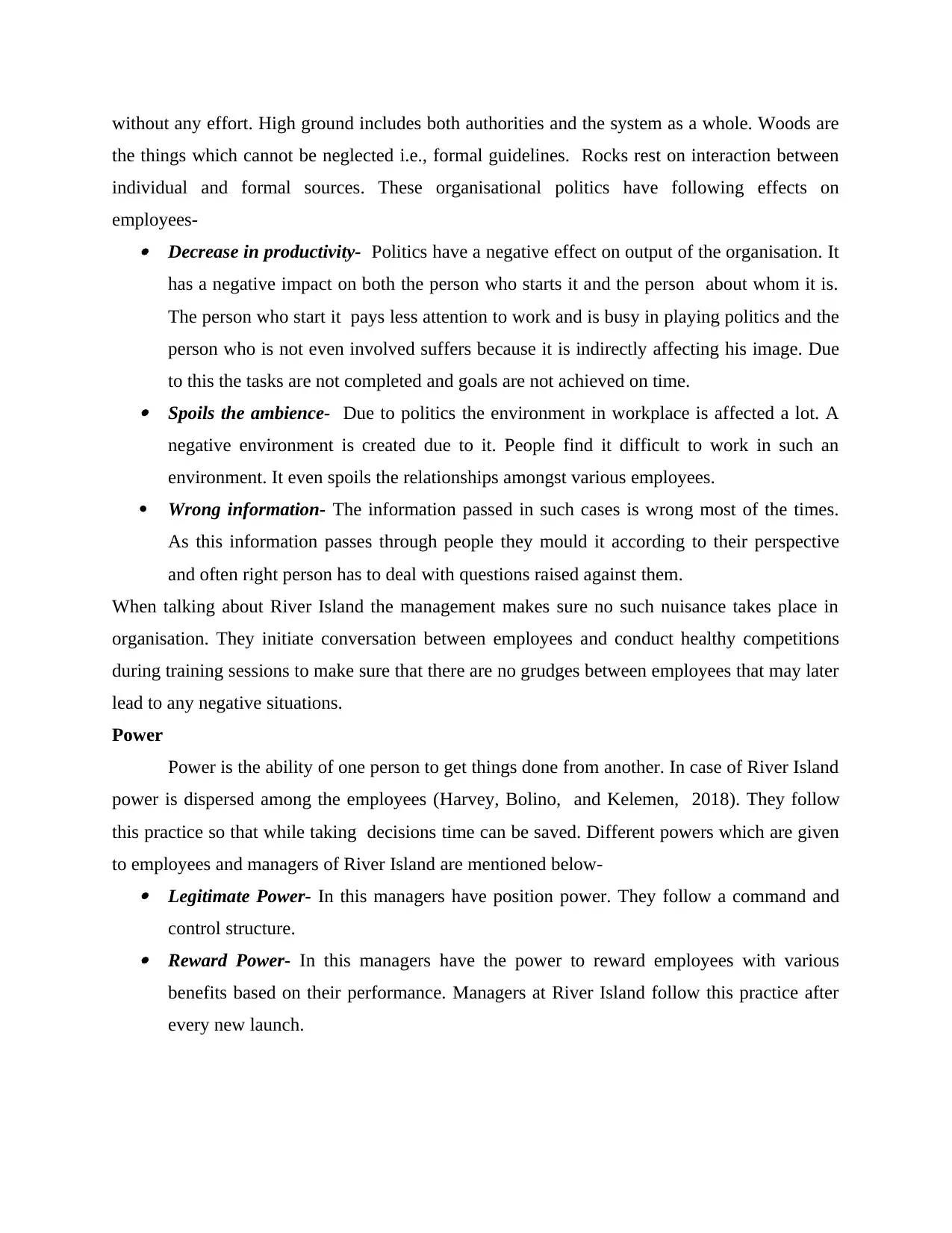
without any effort. High ground includes both authorities and the system as a whole. Woods are
the things which cannot be neglected i.e., formal guidelines. Rocks rest on interaction between
individual and formal sources. These organisational politics have following effects on
employees- Decrease in productivity- Politics have a negative effect on output of the organisation. It
has a negative impact on both the person who starts it and the person about whom it is.
The person who start it pays less attention to work and is busy in playing politics and the
person who is not even involved suffers because it is indirectly affecting his image. Due
to this the tasks are not completed and goals are not achieved on time. Spoils the ambience- Due to politics the environment in workplace is affected a lot. A
negative environment is created due to it. People find it difficult to work in such an
environment. It even spoils the relationships amongst various employees.
Wrong information- The information passed in such cases is wrong most of the times.
As this information passes through people they mould it according to their perspective
and often right person has to deal with questions raised against them.
When talking about River Island the management makes sure no such nuisance takes place in
organisation. They initiate conversation between employees and conduct healthy competitions
during training sessions to make sure that there are no grudges between employees that may later
lead to any negative situations.
Power
Power is the ability of one person to get things done from another. In case of River Island
power is dispersed among the employees (Harvey, Bolino, and Kelemen, 2018). They follow
this practice so that while taking decisions time can be saved. Different powers which are given
to employees and managers of River Island are mentioned below- Legitimate Power- In this managers have position power. They follow a command and
control structure. Reward Power- In this managers have the power to reward employees with various
benefits based on their performance. Managers at River Island follow this practice after
every new launch.
the things which cannot be neglected i.e., formal guidelines. Rocks rest on interaction between
individual and formal sources. These organisational politics have following effects on
employees- Decrease in productivity- Politics have a negative effect on output of the organisation. It
has a negative impact on both the person who starts it and the person about whom it is.
The person who start it pays less attention to work and is busy in playing politics and the
person who is not even involved suffers because it is indirectly affecting his image. Due
to this the tasks are not completed and goals are not achieved on time. Spoils the ambience- Due to politics the environment in workplace is affected a lot. A
negative environment is created due to it. People find it difficult to work in such an
environment. It even spoils the relationships amongst various employees.
Wrong information- The information passed in such cases is wrong most of the times.
As this information passes through people they mould it according to their perspective
and often right person has to deal with questions raised against them.
When talking about River Island the management makes sure no such nuisance takes place in
organisation. They initiate conversation between employees and conduct healthy competitions
during training sessions to make sure that there are no grudges between employees that may later
lead to any negative situations.
Power
Power is the ability of one person to get things done from another. In case of River Island
power is dispersed among the employees (Harvey, Bolino, and Kelemen, 2018). They follow
this practice so that while taking decisions time can be saved. Different powers which are given
to employees and managers of River Island are mentioned below- Legitimate Power- In this managers have position power. They follow a command and
control structure. Reward Power- In this managers have the power to reward employees with various
benefits based on their performance. Managers at River Island follow this practice after
every new launch.
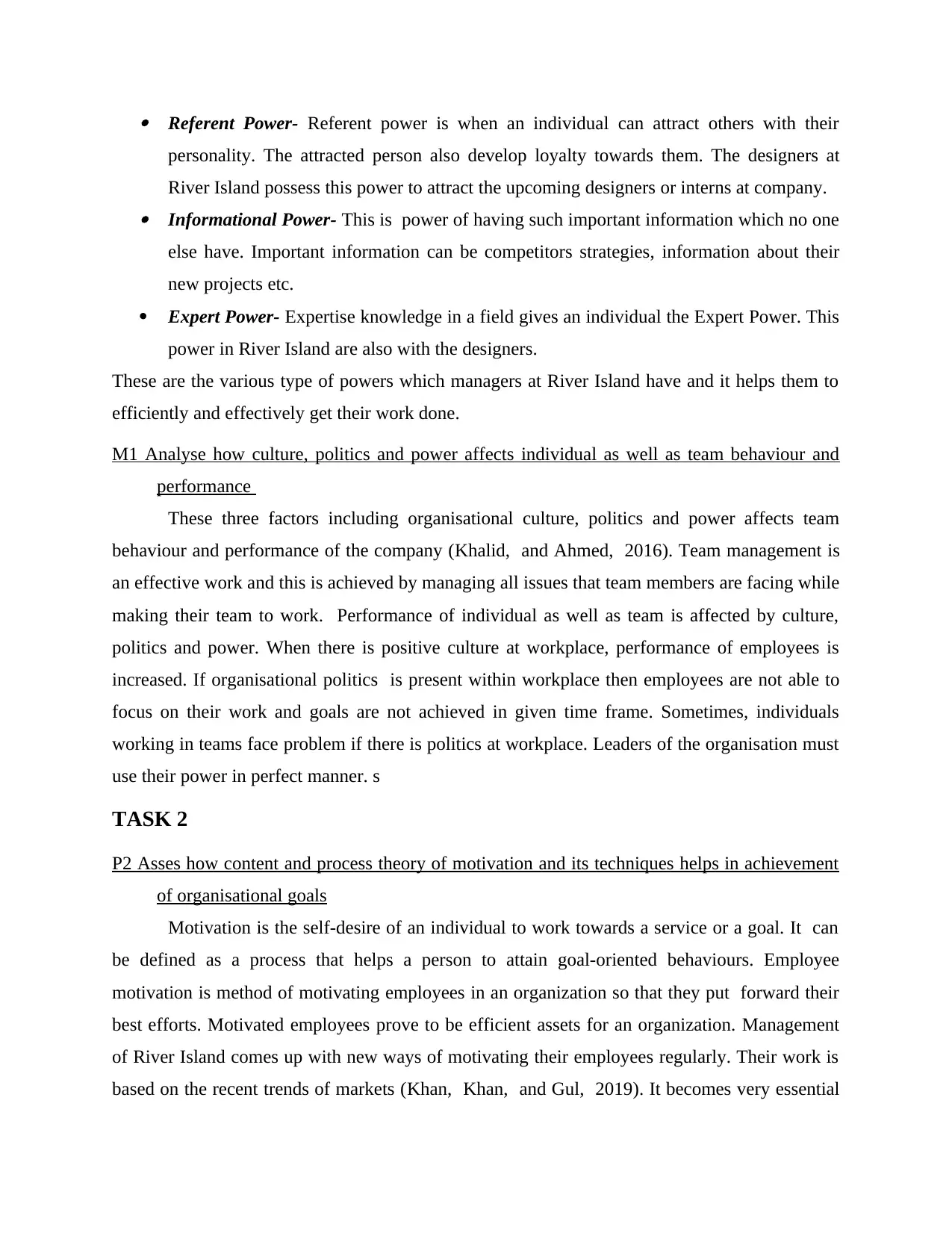
Referent Power- Referent power is when an individual can attract others with their
personality. The attracted person also develop loyalty towards them. The designers at
River Island possess this power to attract the upcoming designers or interns at company. Informational Power- This is power of having such important information which no one
else have. Important information can be competitors strategies, information about their
new projects etc.
Expert Power- Expertise knowledge in a field gives an individual the Expert Power. This
power in River Island are also with the designers.
These are the various type of powers which managers at River Island have and it helps them to
efficiently and effectively get their work done.
M1 Analyse how culture, politics and power affects individual as well as team behaviour and
performance
These three factors including organisational culture, politics and power affects team
behaviour and performance of the company (Khalid, and Ahmed, 2016). Team management is
an effective work and this is achieved by managing all issues that team members are facing while
making their team to work. Performance of individual as well as team is affected by culture,
politics and power. When there is positive culture at workplace, performance of employees is
increased. If organisational politics is present within workplace then employees are not able to
focus on their work and goals are not achieved in given time frame. Sometimes, individuals
working in teams face problem if there is politics at workplace. Leaders of the organisation must
use their power in perfect manner. s
TASK 2
P2 Asses how content and process theory of motivation and its techniques helps in achievement
of organisational goals
Motivation is the self-desire of an individual to work towards a service or a goal. It can
be defined as a process that helps a person to attain goal-oriented behaviours. Employee
motivation is method of motivating employees in an organization so that they put forward their
best efforts. Motivated employees prove to be efficient assets for an organization. Management
of River Island comes up with new ways of motivating their employees regularly. Their work is
based on the recent trends of markets (Khan, Khan, and Gul, 2019). It becomes very essential
personality. The attracted person also develop loyalty towards them. The designers at
River Island possess this power to attract the upcoming designers or interns at company. Informational Power- This is power of having such important information which no one
else have. Important information can be competitors strategies, information about their
new projects etc.
Expert Power- Expertise knowledge in a field gives an individual the Expert Power. This
power in River Island are also with the designers.
These are the various type of powers which managers at River Island have and it helps them to
efficiently and effectively get their work done.
M1 Analyse how culture, politics and power affects individual as well as team behaviour and
performance
These three factors including organisational culture, politics and power affects team
behaviour and performance of the company (Khalid, and Ahmed, 2016). Team management is
an effective work and this is achieved by managing all issues that team members are facing while
making their team to work. Performance of individual as well as team is affected by culture,
politics and power. When there is positive culture at workplace, performance of employees is
increased. If organisational politics is present within workplace then employees are not able to
focus on their work and goals are not achieved in given time frame. Sometimes, individuals
working in teams face problem if there is politics at workplace. Leaders of the organisation must
use their power in perfect manner. s
TASK 2
P2 Asses how content and process theory of motivation and its techniques helps in achievement
of organisational goals
Motivation is the self-desire of an individual to work towards a service or a goal. It can
be defined as a process that helps a person to attain goal-oriented behaviours. Employee
motivation is method of motivating employees in an organization so that they put forward their
best efforts. Motivated employees prove to be efficient assets for an organization. Management
of River Island comes up with new ways of motivating their employees regularly. Their work is
based on the recent trends of markets (Khan, Khan, and Gul, 2019). It becomes very essential
⊘ This is a preview!⊘
Do you want full access?
Subscribe today to unlock all pages.

Trusted by 1+ million students worldwide
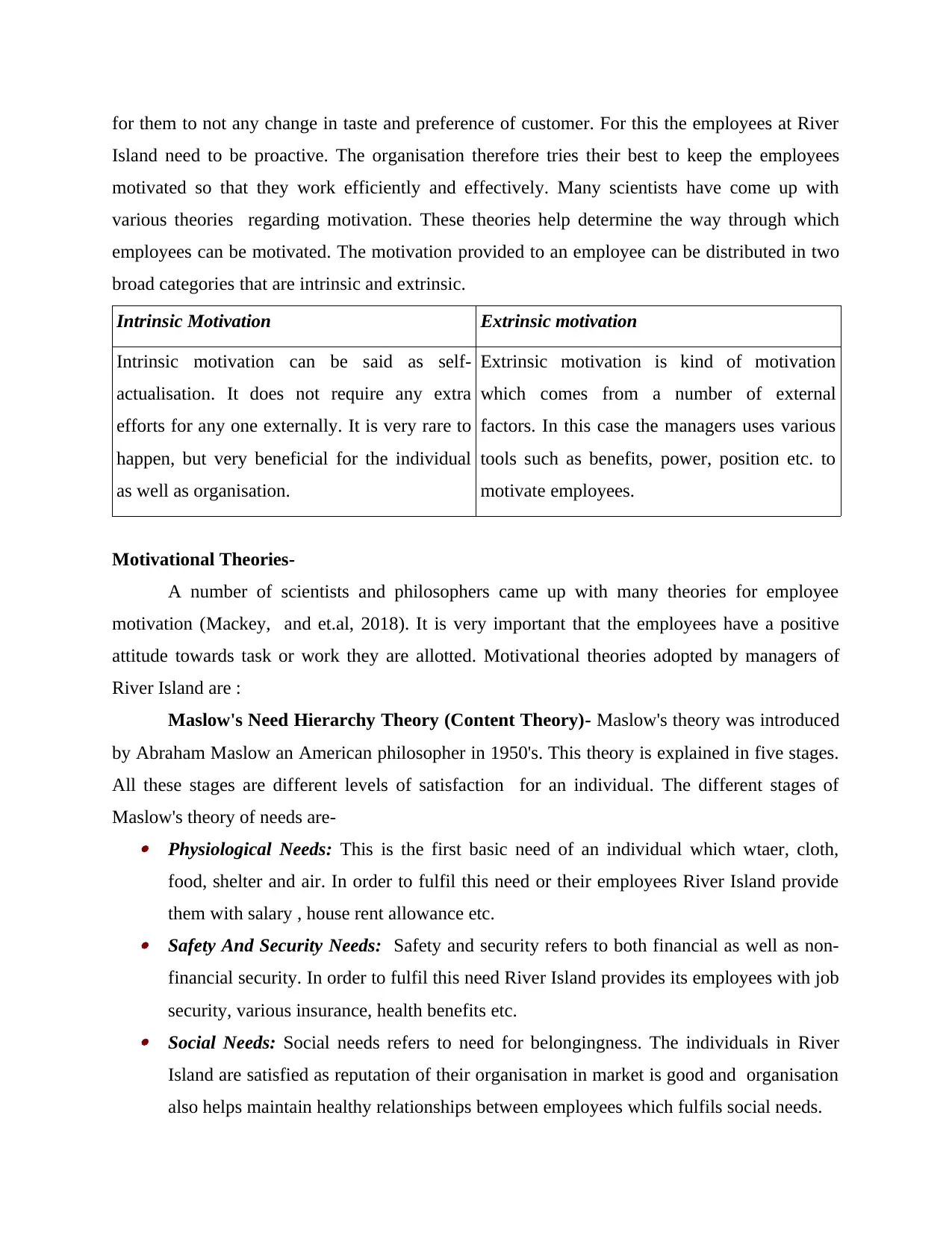
for them to not any change in taste and preference of customer. For this the employees at River
Island need to be proactive. The organisation therefore tries their best to keep the employees
motivated so that they work efficiently and effectively. Many scientists have come up with
various theories regarding motivation. These theories help determine the way through which
employees can be motivated. The motivation provided to an employee can be distributed in two
broad categories that are intrinsic and extrinsic.
Intrinsic Motivation Extrinsic motivation
Intrinsic motivation can be said as self-
actualisation. It does not require any extra
efforts for any one externally. It is very rare to
happen, but very beneficial for the individual
as well as organisation.
Extrinsic motivation is kind of motivation
which comes from a number of external
factors. In this case the managers uses various
tools such as benefits, power, position etc. to
motivate employees.
Motivational Theories-
A number of scientists and philosophers came up with many theories for employee
motivation (Mackey, and et.al, 2018). It is very important that the employees have a positive
attitude towards task or work they are allotted. Motivational theories adopted by managers of
River Island are :
Maslow's Need Hierarchy Theory (Content Theory)- Maslow's theory was introduced
by Abraham Maslow an American philosopher in 1950's. This theory is explained in five stages.
All these stages are different levels of satisfaction for an individual. The different stages of
Maslow's theory of needs are- Physiological Needs: This is the first basic need of an individual which wtaer, cloth,
food, shelter and air. In order to fulfil this need or their employees River Island provide
them with salary , house rent allowance etc. Safety And Security Needs: Safety and security refers to both financial as well as non-
financial security. In order to fulfil this need River Island provides its employees with job
security, various insurance, health benefits etc. Social Needs: Social needs refers to need for belongingness. The individuals in River
Island are satisfied as reputation of their organisation in market is good and organisation
also helps maintain healthy relationships between employees which fulfils social needs.
Island need to be proactive. The organisation therefore tries their best to keep the employees
motivated so that they work efficiently and effectively. Many scientists have come up with
various theories regarding motivation. These theories help determine the way through which
employees can be motivated. The motivation provided to an employee can be distributed in two
broad categories that are intrinsic and extrinsic.
Intrinsic Motivation Extrinsic motivation
Intrinsic motivation can be said as self-
actualisation. It does not require any extra
efforts for any one externally. It is very rare to
happen, but very beneficial for the individual
as well as organisation.
Extrinsic motivation is kind of motivation
which comes from a number of external
factors. In this case the managers uses various
tools such as benefits, power, position etc. to
motivate employees.
Motivational Theories-
A number of scientists and philosophers came up with many theories for employee
motivation (Mackey, and et.al, 2018). It is very important that the employees have a positive
attitude towards task or work they are allotted. Motivational theories adopted by managers of
River Island are :
Maslow's Need Hierarchy Theory (Content Theory)- Maslow's theory was introduced
by Abraham Maslow an American philosopher in 1950's. This theory is explained in five stages.
All these stages are different levels of satisfaction for an individual. The different stages of
Maslow's theory of needs are- Physiological Needs: This is the first basic need of an individual which wtaer, cloth,
food, shelter and air. In order to fulfil this need or their employees River Island provide
them with salary , house rent allowance etc. Safety And Security Needs: Safety and security refers to both financial as well as non-
financial security. In order to fulfil this need River Island provides its employees with job
security, various insurance, health benefits etc. Social Needs: Social needs refers to need for belongingness. The individuals in River
Island are satisfied as reputation of their organisation in market is good and organisation
also helps maintain healthy relationships between employees which fulfils social needs.
Paraphrase This Document
Need a fresh take? Get an instant paraphrase of this document with our AI Paraphraser
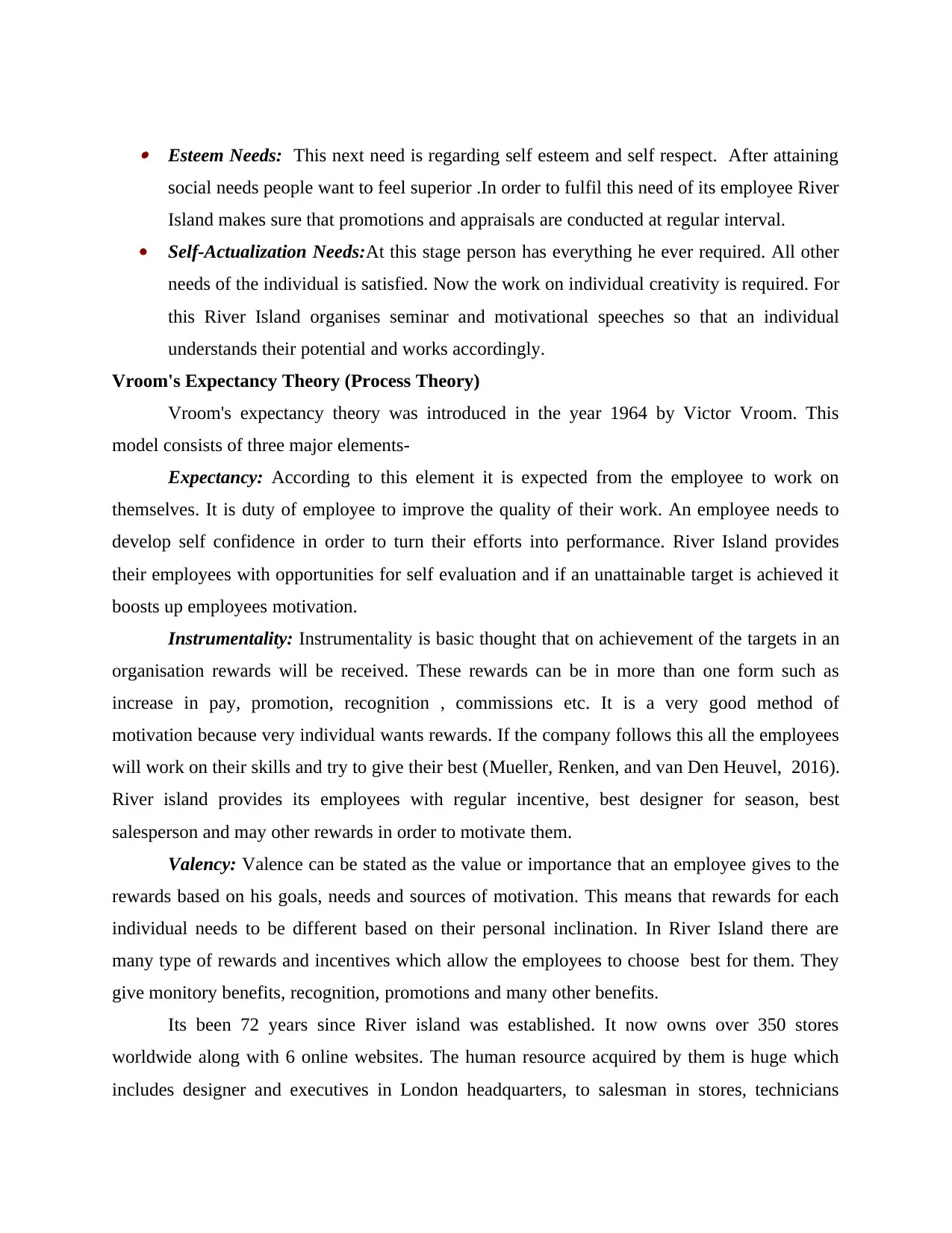
Esteem Needs: This next need is regarding self esteem and self respect. After attaining
social needs people want to feel superior .In order to fulfil this need of its employee River
Island makes sure that promotions and appraisals are conducted at regular interval.
Self-Actualization Needs:At this stage person has everything he ever required. All other
needs of the individual is satisfied. Now the work on individual creativity is required. For
this River Island organises seminar and motivational speeches so that an individual
understands their potential and works accordingly.
Vroom's Expectancy Theory (Process Theory)
Vroom's expectancy theory was introduced in the year 1964 by Victor Vroom. This
model consists of three major elements-
Expectancy: According to this element it is expected from the employee to work on
themselves. It is duty of employee to improve the quality of their work. An employee needs to
develop self confidence in order to turn their efforts into performance. River Island provides
their employees with opportunities for self evaluation and if an unattainable target is achieved it
boosts up employees motivation.
Instrumentality: Instrumentality is basic thought that on achievement of the targets in an
organisation rewards will be received. These rewards can be in more than one form such as
increase in pay, promotion, recognition , commissions etc. It is a very good method of
motivation because very individual wants rewards. If the company follows this all the employees
will work on their skills and try to give their best (Mueller, Renken, and van Den Heuvel, 2016).
River island provides its employees with regular incentive, best designer for season, best
salesperson and may other rewards in order to motivate them.
Valency: Valence can be stated as the value or importance that an employee gives to the
rewards based on his goals, needs and sources of motivation. This means that rewards for each
individual needs to be different based on their personal inclination. In River Island there are
many type of rewards and incentives which allow the employees to choose best for them. They
give monitory benefits, recognition, promotions and many other benefits.
Its been 72 years since River island was established. It now owns over 350 stores
worldwide along with 6 online websites. The human resource acquired by them is huge which
includes designer and executives in London headquarters, to salesman in stores, technicians
social needs people want to feel superior .In order to fulfil this need of its employee River
Island makes sure that promotions and appraisals are conducted at regular interval.
Self-Actualization Needs:At this stage person has everything he ever required. All other
needs of the individual is satisfied. Now the work on individual creativity is required. For
this River Island organises seminar and motivational speeches so that an individual
understands their potential and works accordingly.
Vroom's Expectancy Theory (Process Theory)
Vroom's expectancy theory was introduced in the year 1964 by Victor Vroom. This
model consists of three major elements-
Expectancy: According to this element it is expected from the employee to work on
themselves. It is duty of employee to improve the quality of their work. An employee needs to
develop self confidence in order to turn their efforts into performance. River Island provides
their employees with opportunities for self evaluation and if an unattainable target is achieved it
boosts up employees motivation.
Instrumentality: Instrumentality is basic thought that on achievement of the targets in an
organisation rewards will be received. These rewards can be in more than one form such as
increase in pay, promotion, recognition , commissions etc. It is a very good method of
motivation because very individual wants rewards. If the company follows this all the employees
will work on their skills and try to give their best (Mueller, Renken, and van Den Heuvel, 2016).
River island provides its employees with regular incentive, best designer for season, best
salesperson and may other rewards in order to motivate them.
Valency: Valence can be stated as the value or importance that an employee gives to the
rewards based on his goals, needs and sources of motivation. This means that rewards for each
individual needs to be different based on their personal inclination. In River Island there are
many type of rewards and incentives which allow the employees to choose best for them. They
give monitory benefits, recognition, promotions and many other benefits.
Its been 72 years since River island was established. It now owns over 350 stores
worldwide along with 6 online websites. The human resource acquired by them is huge which
includes designer and executives in London headquarters, to salesman in stores, technicians
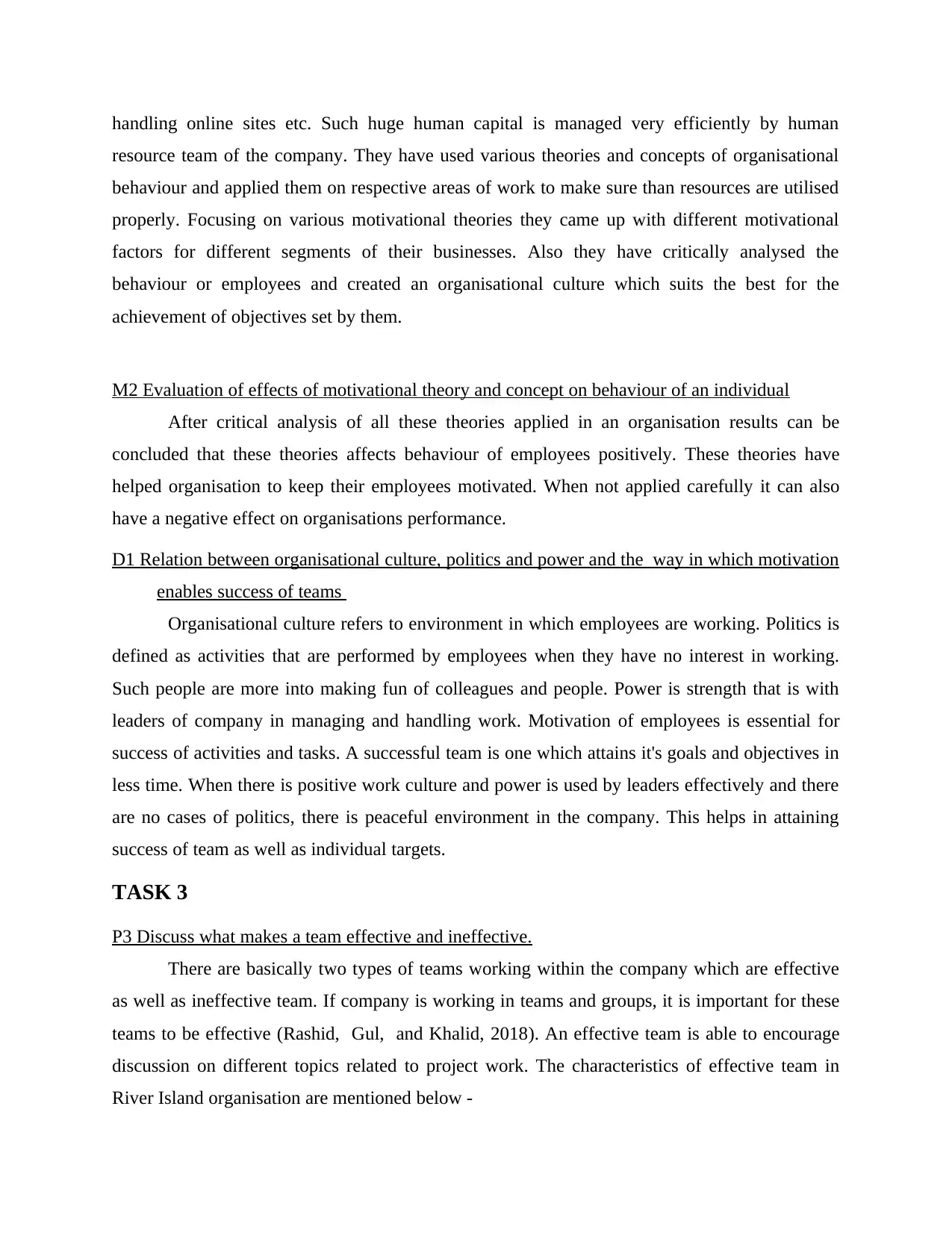
handling online sites etc. Such huge human capital is managed very efficiently by human
resource team of the company. They have used various theories and concepts of organisational
behaviour and applied them on respective areas of work to make sure than resources are utilised
properly. Focusing on various motivational theories they came up with different motivational
factors for different segments of their businesses. Also they have critically analysed the
behaviour or employees and created an organisational culture which suits the best for the
achievement of objectives set by them.
M2 Evaluation of effects of motivational theory and concept on behaviour of an individual
After critical analysis of all these theories applied in an organisation results can be
concluded that these theories affects behaviour of employees positively. These theories have
helped organisation to keep their employees motivated. When not applied carefully it can also
have a negative effect on organisations performance.
D1 Relation between organisational culture, politics and power and the way in which motivation
enables success of teams
Organisational culture refers to environment in which employees are working. Politics is
defined as activities that are performed by employees when they have no interest in working.
Such people are more into making fun of colleagues and people. Power is strength that is with
leaders of company in managing and handling work. Motivation of employees is essential for
success of activities and tasks. A successful team is one which attains it's goals and objectives in
less time. When there is positive work culture and power is used by leaders effectively and there
are no cases of politics, there is peaceful environment in the company. This helps in attaining
success of team as well as individual targets.
TASK 3
P3 Discuss what makes a team effective and ineffective.
There are basically two types of teams working within the company which are effective
as well as ineffective team. If company is working in teams and groups, it is important for these
teams to be effective (Rashid, Gul, and Khalid, 2018). An effective team is able to encourage
discussion on different topics related to project work. The characteristics of effective team in
River Island organisation are mentioned below -
resource team of the company. They have used various theories and concepts of organisational
behaviour and applied them on respective areas of work to make sure than resources are utilised
properly. Focusing on various motivational theories they came up with different motivational
factors for different segments of their businesses. Also they have critically analysed the
behaviour or employees and created an organisational culture which suits the best for the
achievement of objectives set by them.
M2 Evaluation of effects of motivational theory and concept on behaviour of an individual
After critical analysis of all these theories applied in an organisation results can be
concluded that these theories affects behaviour of employees positively. These theories have
helped organisation to keep their employees motivated. When not applied carefully it can also
have a negative effect on organisations performance.
D1 Relation between organisational culture, politics and power and the way in which motivation
enables success of teams
Organisational culture refers to environment in which employees are working. Politics is
defined as activities that are performed by employees when they have no interest in working.
Such people are more into making fun of colleagues and people. Power is strength that is with
leaders of company in managing and handling work. Motivation of employees is essential for
success of activities and tasks. A successful team is one which attains it's goals and objectives in
less time. When there is positive work culture and power is used by leaders effectively and there
are no cases of politics, there is peaceful environment in the company. This helps in attaining
success of team as well as individual targets.
TASK 3
P3 Discuss what makes a team effective and ineffective.
There are basically two types of teams working within the company which are effective
as well as ineffective team. If company is working in teams and groups, it is important for these
teams to be effective (Rashid, Gul, and Khalid, 2018). An effective team is able to encourage
discussion on different topics related to project work. The characteristics of effective team in
River Island organisation are mentioned below -
⊘ This is a preview!⊘
Do you want full access?
Subscribe today to unlock all pages.

Trusted by 1+ million students worldwide
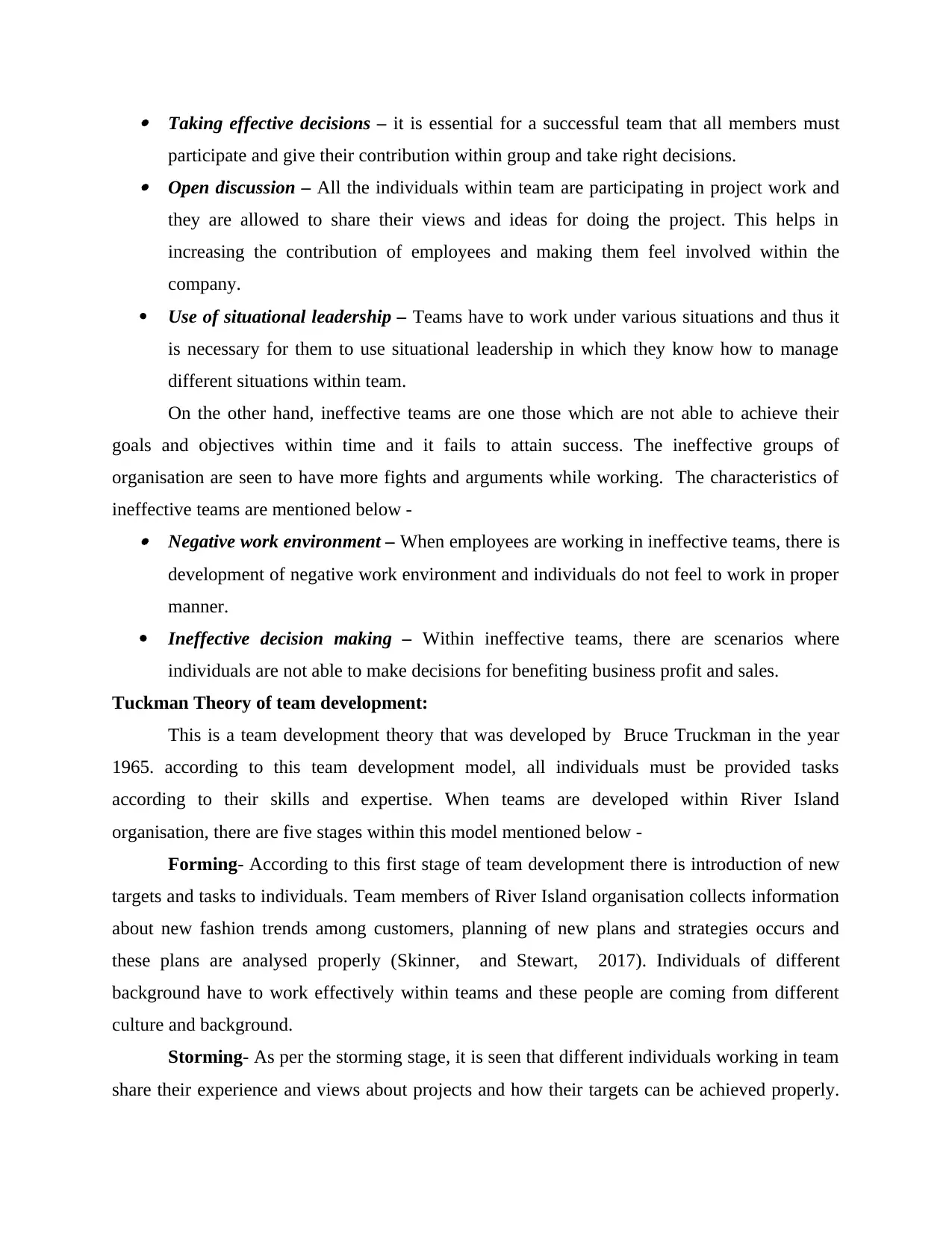
Taking effective decisions – it is essential for a successful team that all members must
participate and give their contribution within group and take right decisions. Open discussion – All the individuals within team are participating in project work and
they are allowed to share their views and ideas for doing the project. This helps in
increasing the contribution of employees and making them feel involved within the
company.
Use of situational leadership – Teams have to work under various situations and thus it
is necessary for them to use situational leadership in which they know how to manage
different situations within team.
On the other hand, ineffective teams are one those which are not able to achieve their
goals and objectives within time and it fails to attain success. The ineffective groups of
organisation are seen to have more fights and arguments while working. The characteristics of
ineffective teams are mentioned below - Negative work environment – When employees are working in ineffective teams, there is
development of negative work environment and individuals do not feel to work in proper
manner.
Ineffective decision making – Within ineffective teams, there are scenarios where
individuals are not able to make decisions for benefiting business profit and sales.
Tuckman Theory of team development:
This is a team development theory that was developed by Bruce Truckman in the year
1965. according to this team development model, all individuals must be provided tasks
according to their skills and expertise. When teams are developed within River Island
organisation, there are five stages within this model mentioned below -
Forming- According to this first stage of team development there is introduction of new
targets and tasks to individuals. Team members of River Island organisation collects information
about new fashion trends among customers, planning of new plans and strategies occurs and
these plans are analysed properly (Skinner, and Stewart, 2017). Individuals of different
background have to work effectively within teams and these people are coming from different
culture and background.
Storming- As per the storming stage, it is seen that different individuals working in team
share their experience and views about projects and how their targets can be achieved properly.
participate and give their contribution within group and take right decisions. Open discussion – All the individuals within team are participating in project work and
they are allowed to share their views and ideas for doing the project. This helps in
increasing the contribution of employees and making them feel involved within the
company.
Use of situational leadership – Teams have to work under various situations and thus it
is necessary for them to use situational leadership in which they know how to manage
different situations within team.
On the other hand, ineffective teams are one those which are not able to achieve their
goals and objectives within time and it fails to attain success. The ineffective groups of
organisation are seen to have more fights and arguments while working. The characteristics of
ineffective teams are mentioned below - Negative work environment – When employees are working in ineffective teams, there is
development of negative work environment and individuals do not feel to work in proper
manner.
Ineffective decision making – Within ineffective teams, there are scenarios where
individuals are not able to make decisions for benefiting business profit and sales.
Tuckman Theory of team development:
This is a team development theory that was developed by Bruce Truckman in the year
1965. according to this team development model, all individuals must be provided tasks
according to their skills and expertise. When teams are developed within River Island
organisation, there are five stages within this model mentioned below -
Forming- According to this first stage of team development there is introduction of new
targets and tasks to individuals. Team members of River Island organisation collects information
about new fashion trends among customers, planning of new plans and strategies occurs and
these plans are analysed properly (Skinner, and Stewart, 2017). Individuals of different
background have to work effectively within teams and these people are coming from different
culture and background.
Storming- As per the storming stage, it is seen that different individuals working in team
share their experience and views about projects and how their targets can be achieved properly.
Paraphrase This Document
Need a fresh take? Get an instant paraphrase of this document with our AI Paraphraser
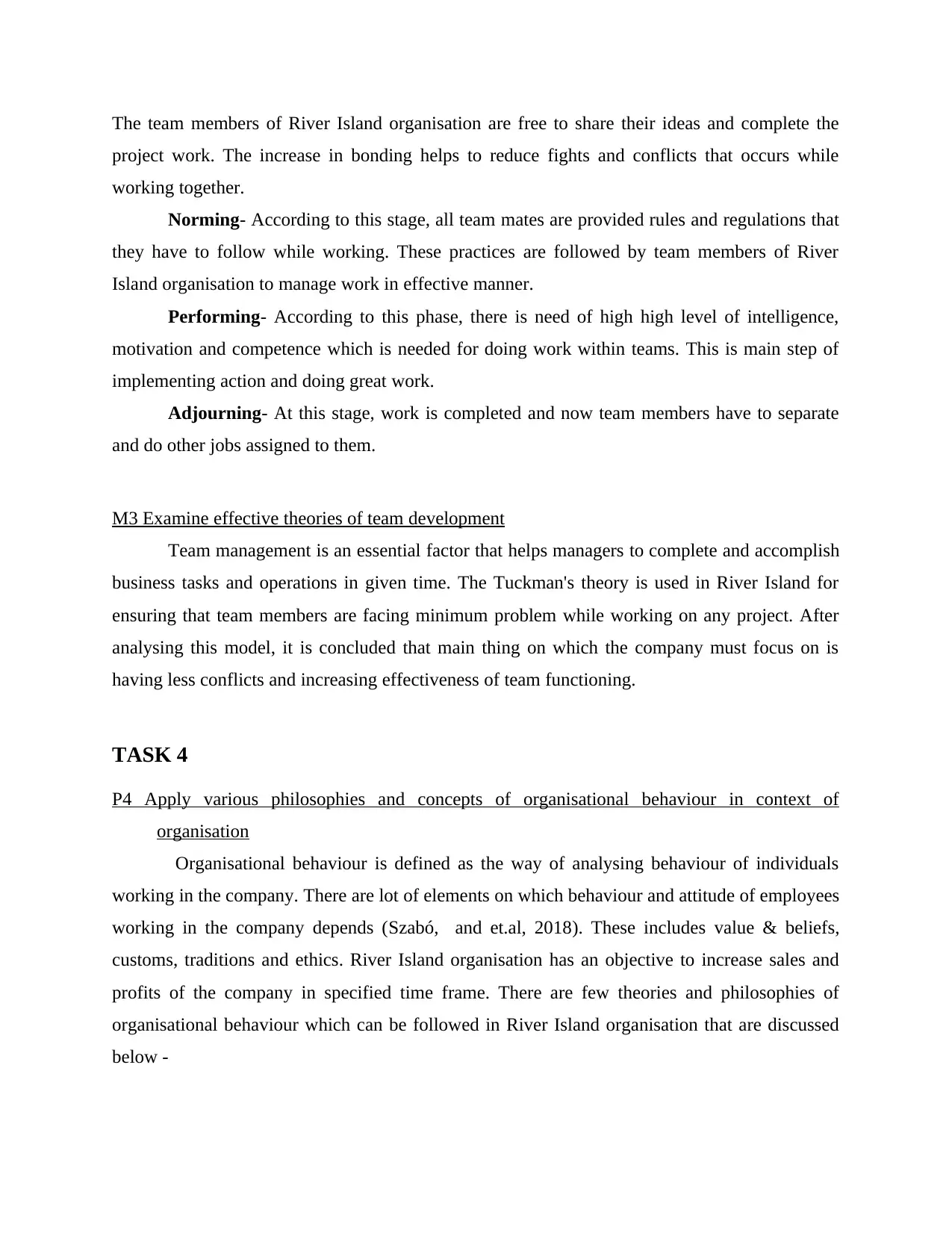
The team members of River Island organisation are free to share their ideas and complete the
project work. The increase in bonding helps to reduce fights and conflicts that occurs while
working together.
Norming- According to this stage, all team mates are provided rules and regulations that
they have to follow while working. These practices are followed by team members of River
Island organisation to manage work in effective manner.
Performing- According to this phase, there is need of high high level of intelligence,
motivation and competence which is needed for doing work within teams. This is main step of
implementing action and doing great work.
Adjourning- At this stage, work is completed and now team members have to separate
and do other jobs assigned to them.
M3 Examine effective theories of team development
Team management is an essential factor that helps managers to complete and accomplish
business tasks and operations in given time. The Tuckman's theory is used in River Island for
ensuring that team members are facing minimum problem while working on any project. After
analysing this model, it is concluded that main thing on which the company must focus on is
having less conflicts and increasing effectiveness of team functioning.
TASK 4
P4 Apply various philosophies and concepts of organisational behaviour in context of
organisation
Organisational behaviour is defined as the way of analysing behaviour of individuals
working in the company. There are lot of elements on which behaviour and attitude of employees
working in the company depends (Szabó, and et.al, 2018). These includes value & beliefs,
customs, traditions and ethics. River Island organisation has an objective to increase sales and
profits of the company in specified time frame. There are few theories and philosophies of
organisational behaviour which can be followed in River Island organisation that are discussed
below -
project work. The increase in bonding helps to reduce fights and conflicts that occurs while
working together.
Norming- According to this stage, all team mates are provided rules and regulations that
they have to follow while working. These practices are followed by team members of River
Island organisation to manage work in effective manner.
Performing- According to this phase, there is need of high high level of intelligence,
motivation and competence which is needed for doing work within teams. This is main step of
implementing action and doing great work.
Adjourning- At this stage, work is completed and now team members have to separate
and do other jobs assigned to them.
M3 Examine effective theories of team development
Team management is an essential factor that helps managers to complete and accomplish
business tasks and operations in given time. The Tuckman's theory is used in River Island for
ensuring that team members are facing minimum problem while working on any project. After
analysing this model, it is concluded that main thing on which the company must focus on is
having less conflicts and increasing effectiveness of team functioning.
TASK 4
P4 Apply various philosophies and concepts of organisational behaviour in context of
organisation
Organisational behaviour is defined as the way of analysing behaviour of individuals
working in the company. There are lot of elements on which behaviour and attitude of employees
working in the company depends (Szabó, and et.al, 2018). These includes value & beliefs,
customs, traditions and ethics. River Island organisation has an objective to increase sales and
profits of the company in specified time frame. There are few theories and philosophies of
organisational behaviour which can be followed in River Island organisation that are discussed
below -
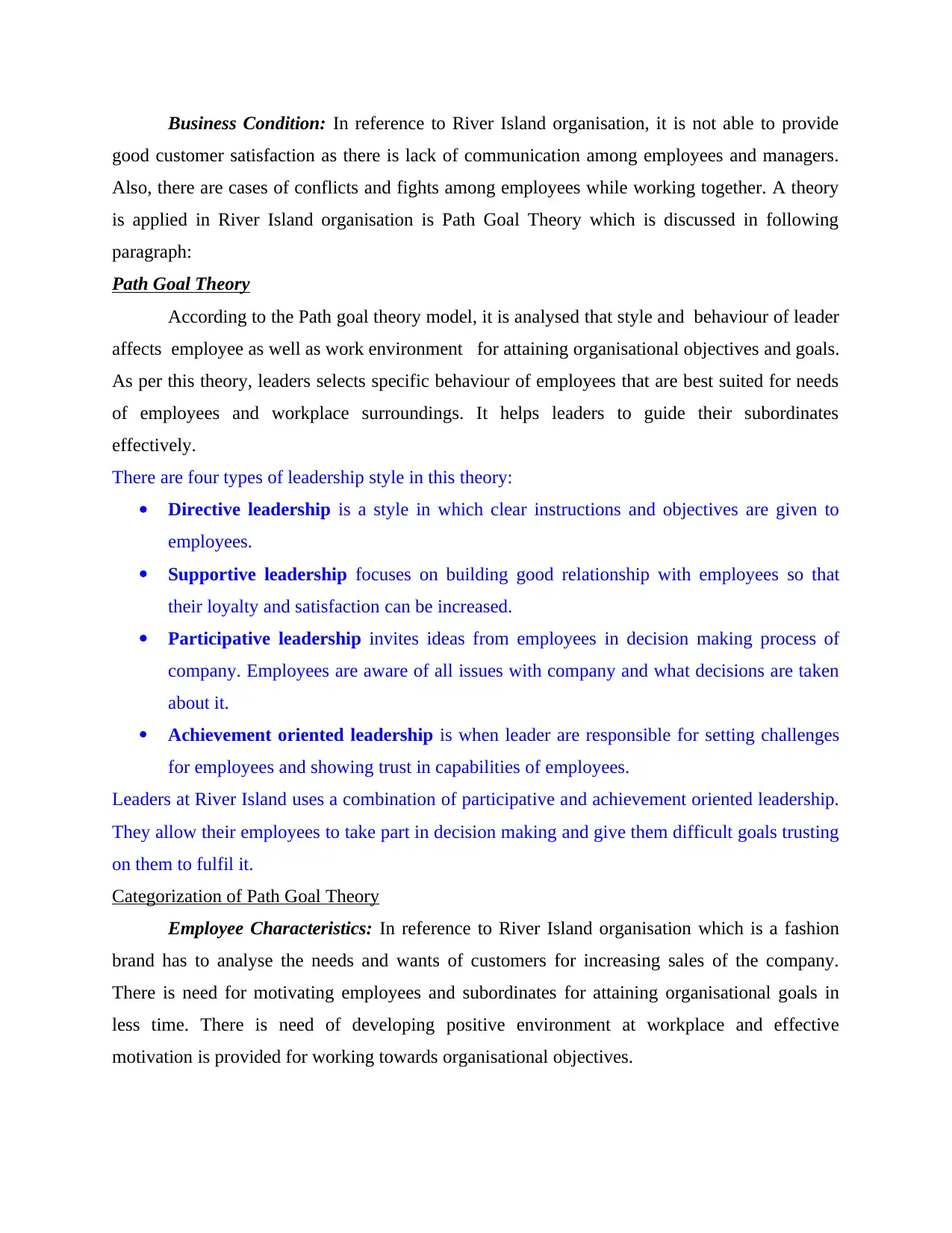
Business Condition: In reference to River Island organisation, it is not able to provide
good customer satisfaction as there is lack of communication among employees and managers.
Also, there are cases of conflicts and fights among employees while working together. A theory
is applied in River Island organisation is Path Goal Theory which is discussed in following
paragraph:
Path Goal Theory
According to the Path goal theory model, it is analysed that style and behaviour of leader
affects employee as well as work environment for attaining organisational objectives and goals.
As per this theory, leaders selects specific behaviour of employees that are best suited for needs
of employees and workplace surroundings. It helps leaders to guide their subordinates
effectively.
There are four types of leadership style in this theory:
Directive leadership is a style in which clear instructions and objectives are given to
employees.
Supportive leadership focuses on building good relationship with employees so that
their loyalty and satisfaction can be increased.
Participative leadership invites ideas from employees in decision making process of
company. Employees are aware of all issues with company and what decisions are taken
about it.
Achievement oriented leadership is when leader are responsible for setting challenges
for employees and showing trust in capabilities of employees.
Leaders at River Island uses a combination of participative and achievement oriented leadership.
They allow their employees to take part in decision making and give them difficult goals trusting
on them to fulfil it.
Categorization of Path Goal Theory
Employee Characteristics: In reference to River Island organisation which is a fashion
brand has to analyse the needs and wants of customers for increasing sales of the company.
There is need for motivating employees and subordinates for attaining organisational goals in
less time. There is need of developing positive environment at workplace and effective
motivation is provided for working towards organisational objectives.
good customer satisfaction as there is lack of communication among employees and managers.
Also, there are cases of conflicts and fights among employees while working together. A theory
is applied in River Island organisation is Path Goal Theory which is discussed in following
paragraph:
Path Goal Theory
According to the Path goal theory model, it is analysed that style and behaviour of leader
affects employee as well as work environment for attaining organisational objectives and goals.
As per this theory, leaders selects specific behaviour of employees that are best suited for needs
of employees and workplace surroundings. It helps leaders to guide their subordinates
effectively.
There are four types of leadership style in this theory:
Directive leadership is a style in which clear instructions and objectives are given to
employees.
Supportive leadership focuses on building good relationship with employees so that
their loyalty and satisfaction can be increased.
Participative leadership invites ideas from employees in decision making process of
company. Employees are aware of all issues with company and what decisions are taken
about it.
Achievement oriented leadership is when leader are responsible for setting challenges
for employees and showing trust in capabilities of employees.
Leaders at River Island uses a combination of participative and achievement oriented leadership.
They allow their employees to take part in decision making and give them difficult goals trusting
on them to fulfil it.
Categorization of Path Goal Theory
Employee Characteristics: In reference to River Island organisation which is a fashion
brand has to analyse the needs and wants of customers for increasing sales of the company.
There is need for motivating employees and subordinates for attaining organisational goals in
less time. There is need of developing positive environment at workplace and effective
motivation is provided for working towards organisational objectives.
⊘ This is a preview!⊘
Do you want full access?
Subscribe today to unlock all pages.

Trusted by 1+ million students worldwide
1 out of 15
Related Documents
Your All-in-One AI-Powered Toolkit for Academic Success.
+13062052269
info@desklib.com
Available 24*7 on WhatsApp / Email
![[object Object]](/_next/static/media/star-bottom.7253800d.svg)
Unlock your academic potential
Copyright © 2020–2026 A2Z Services. All Rights Reserved. Developed and managed by ZUCOL.




